|
Best Film Speeches and Monologues
|
|
Title Screen
|
Film Title/Year and Description of Film Speech/Monologue |
Screenshots
|

|
Inside Daisy Clover (1965)
Screenwriter(s): Gavin Lambert
 A
Poolside Soliloquy by a Hollywood Studio Head About A
Failed Marital Romance ("A Lost Cause") and Movie Stardom A
Poolside Soliloquy by a Hollywood Studio Head About A
Failed Marital Romance ("A Lost Cause") and Movie Stardom
Director Robert Mulligan's strange
and satirical, rags-to-riches melodrama told about the perils
of an adolescent Hollywood star seeking recognition, fame, and
fortune. Natalie Wood (at age 26) starred as the tomboyish,
rebellious, angry, expressive 15-year old ragamuffin-urchin,
Angel Beach boardwalk/pier-dwelling Daisy Clover. She was made
a teenaged star by manipulative, Svengali-like studio
head Raymond Swan (Christopher Plummer), known as the "Prince
of Darkness." Daisy was abandoned at a motel in Arizona on her
honeymoon after marrying self-absorbed, narcissistic homosexual
groom/actor Wade Lewis (Robert Redford). [Swan's
wife Melora (Katharine Bard) had at one time been Wade's lover
as well, and almost committed suicide over him.]
Daisy had returned to Swan's
mansion, and pool-side, he found that she had been sleeping
there overnight. He delivered a
marvelous soliloquy/speech to her following her breakup. He confessed
that he knew Wade was an unsuitable match as a closeted homosexual,
but let her find out for herself (as he had once done with
his wife Melora). He cradled Daisy in his arms and
began his own affair with her - signaled by a passionate kiss:
All the good women and all the good men who
tried to put Wade back together again. Age, sex, doesn't
matter. They take him to heart, he takes them to bed. But
then like any lost cause, they can't give him up. They've
just got to carry on about true love, new life, deep understanding.
Oh. And then one day, they wake up - alone.
She didn't stand
a chance. I told Melora she didn't stand a chance. I told
her what would happen, it happened. And then she cut her
wrists and blamed me. It appears I lack the finer points.
But Wade, oh boy, he's got them all. Thousands of girls sit
watching him in dark movie houses, go home and they dream
about him in dark little bedrooms. Thousands of wives wish
their husbands were exactly like him. Isn't that something?
I mean, you can't help admiring the man.
I just signed him for three more pictures.
What are you going to do? He's in New York. He'll be back.
Couple of weeks. I'll see you don't run into each - each
other. You're blaming me too, aren't you? You know, if -
listen, if I'd warned you. If I'd said, 'Wade isn't your
true love. He's...You're just the best fun he ever had.'
You'd have called it a wicked lie, and then Wade would have
said, uh, 'The Prince of Darkness stops at nothing, dear
heart,' and you'd have eloped immediately.
(He crouched next to her and tenderly
stroked her hair.) It's over Daisy. All over. I've got you
the best divorce lawyer in town -- so sleep it off. Take
a long deep sleep. Sandman's orders. (She stood up and cradled
her head in his chest.) At least you know all about love.
Hmm? (He picked her up in his arms.) All about love. Just
nothing. Lost cause. Just like your husband. Who needs
it? (He kissed her. She wrapped her arms around his neck.)
|
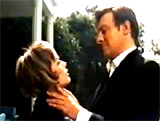
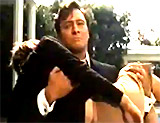
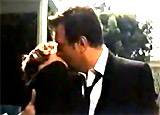
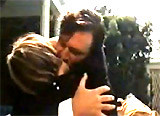
|

|
The
Sound of Music (1965)
Screenwriter(s): Ernest Lehman
 A
Prayer For Her New "Family" A
Prayer For Her New "Family"
Young Austrian abbey postulant Maria (Julie Andrews),
after taking on the temporary job of governess to look after
the seven children of widowed, strict Navy captain Georg von
Trapp (Christopher Plummer), prayed at her bedside - during
a fierce thunderstorm, blessing the Captain and the children:
Dear Father, now I know why you've
sent me here. To help these children prepare themselves
for a new mother. And I pray that this will become a happy
family in thy sight. God bless the captain. God bless Liesl
and Friedrich. God bless Louisa, Brigitta, Marta, and little
Gretl. And, oh, I forgot the other boy. What's his name?
Well, God bless what's-his-name. God bless the Reverend
Mother and Sister Margaretta and everybody at Nonnberg
Abbey. And now, dear God, about Liesl, help her know that
I'm her friend. And help her to tell me what she's been
up to...Shh, help me to be understanding so that I may
guide her footsteps. In the name of the Father, the Son,
and the Holy Ghost, Amen.
As she finished her prayer, a rain-drenched,
love-sick 16 year-old Liesl (Charmian Carr) entered through
her window from her dis-allowed rendezvous with messenger boyfriend
Rolf (Daniel Truhitte). |
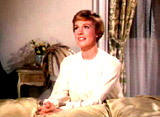
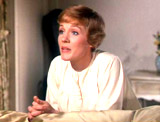
|

|
A Man For
All Seasons (1966, UK)
Screenwriter(s): Robert Bolt
 More's
Own Defense After Condemnation More's
Own Defense After Condemnation
Play clip (excerpt): 
Sir Thomas More (Paul Scofield) made his plea
to the court after being found guilty of high treason, before
he was taken to the Tower of London and executed:
Since the Court has determined to condemn
me, God knoweth how, I will now discharge my mind concerning
the indictment and the King's title. The indictment is
grounded in an act of Parliament which is directly repugnant
to the law of God, and his Holy Church, the Supreme Government
of which no temporal person may by any law presume to take
upon him. This was granted by the mouth of our Savior,
Christ himself, to Saint Peter and the Bishops of Rome
whilst He lived and was personally present here on earth.
It is, therefore, insufficient in law to charge any Christian
to obey it. And more to this, the immunity of the Church
is promised both in Magna Carta and in the king's
own coronation oath...
Not so. I am the king's true subject, and I
pray for him and all the realm. I do none harm. I say none
harm. I think none harm. And if this be not enough to keep
a man alive, then in good faith, I long not to live. Nevertheless,
it is not for the Supremacy that you have sought my blood,
but because I would not bend to the marriage!!
|
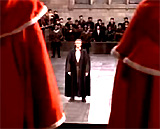
|

|
Persona (1966,
Swe.)
Screenwriter(s): Ingmar Bergman
 Confessed
Verbal Recollections of a Beach Orgy Confessed
Verbal Recollections of a Beach Orgy
Director Ingmar Bergman's intense psychological,
dramatic thriller involved two women in a patient/nurse relationship
during one summer at a seaside cottage or vacation home.
- Sister Alma (Bibi Andersson), a young
25 year-old nurse
- Mrs. Elisabet Vogler (Liv Ullmann), a well-known
stage actress who had been mute and semi-catatonic for three
months, and became Alma's patient
During a vivid confessional monologue (one of
the most explicit verbal descriptions of sex ever heard on
screen), Alma (who was engaged to fiancee Karl-Henrik at the
time) described a private and secret sexual experience to Elisabet
that she had had at the beach with a friend named Katarina
when they were sunbathing in the nude, completely naked. Two
boys came up to them and Katrina encouraged one of the boys
to have sex with her. Feeling left out, Alma also asked for
sex too. Ultimately a second boy named Peter
was also invited to participate:
I went to the beach on my own. It was a warm
and lovely day. There was another girl there. She'd paddled
over from another island because our beach was sunnier
and more secluded. We lay there sunbathing beside one another,
completely naked, dozing now and then, putting suntan lotion
on. We had those cheap straw hats on, you know? I had a blue
ribbon around mine. I lay there peeping out from under my
hat at the landscape and the sea and the sun. It was kind
of funny.
Suddenly, I saw two figures leaping about on
the rocks above us. They would hide and then peek out. 'There's
a couple boys looking at us,' I told the girl. Her name was
Katarina. 'Let them look,' she said, and turned over on her
back. It was a strange feeling. I wanted to jump up and put
on my robe, but I just lay there on my stomach with my bottom
in the air, not at all embarrassed, completely calm. Katarina
lay there next to me the whole time, with her breasts and
thick thighs. She just lay there sort of giggling to herself.
I noticed that the boys had come closer. They just stood
there looking at us. I noticed they were terribly young.
Then one of them, the more daring of the two, came up and
squatted down next to Katarina. He pretended to be busy picking
at his toes. I felt so strange. Suddenly, I heard Katarina
say, 'Hey, why don't you come over here?' She took him by
the hand and helped him off with his jeans and shirt. Then
suddenly, he was on top of her. She guided him in with her
hands on his behind. The other boy just sat on the slope
and watched. I heard Katarina whisper in the boy's ear and
laugh. His face was right next to mine. It was red and swollen.
Suddenly, I turned over and said, 'Aren't
you coming over to me, too?' And Katarina said, 'Go to her
now.' He pulled out of her and fell on top of me, completely
hard. He grabbed my breast. It hurt so bad. I was ready somehow,
and came almost at once. Can you believe it? I was about
to say, 'Careful you don't get me pregnant' - when he suddenly
came. I felt it like never before in my life, the way he
sprayed his seed into me. He gripped my shoulders and arched
backwards. I came over and over. Katarina lay on her side
and watched, and held him from behind. After he came, she
took him in her arms and used his hand to make herself come.
When she came, she screamed like a banshee. Then all three
of us started laughing.
We called to the other boy who was sitting
on the slope. His name was Peter. He came down, looking all
confused and shivering despite the sunshine. Katarina
unbuttoned his pants and started to play with him. And when
he came, she took him in her mouth. He bent down and kissed
her back. She turned around, took his head in both hands
and gave him her breast. The other boy got so excited, that
he and I started all over again. It was just as good as before.
Then we went for a swim and parted ways.
When I got home, Karl-Henrik was already back
from town. We ate dinner and drank some red wine he'd brought. Then
we had sex. It's never been as good, before or since. Can you
understand that?
That evening, although she felt guilty, Alma
had sex with Karl-Henrik after dinner. However, she became
pregnant, was forced to abort the baby, and afterwards suffered
a "guilty conscience." |

Speaker:
Alma
(Bibi Andersson)

Listener:
Elisabet Vogler
(Liv Ullman)



|

|
Who's
Afraid of Virginia Woolf? (1966)
Screenwriter(s): Ernest Lehman
 More
Mind-Games to Play More
Mind-Games to Play
George's (Richard Burton) gleeful proposal to
play more married couples' mind-games:
...OK, I know what we do. Now that we're
through with Humiliate the Host...and we don't want to
play Hump the Hostess yet...how about a little round of
Get the Guests?
|

|

|
The Wild Angels
(1966)
Screenwriter: Charles B. Griffith, Peter
Bogdanovich (uncredited)
 Rambling
Statement of Principles of Freedom Rambling
Statement of Principles of Freedom
Director Roger Corman's cheaply-made exploitational
B-movie - an almost plotless, anti-establishment outlaw biker
film, starred Peter Fonda as Heavenly Blues, the alienated leader
("Mr. President") of a violent, hedonistic, devil-may-care
leather-clad biker gang of Wild Angels (modeled after the Hells Angels)
in Southern California.
When one of the gang members, Blues' buddy Joe
Kearns, aka Loser (Bruce Dern) was lethally wounded after stealing
an Electra Glide in Blue chopper from a highway patrolman,
the gang hatched a successful rescue plan. Loser died shortly
later, and the gang held a memorial funeral service for him
in a small-town church.
Frustrated and fed up by the religious
eulogy from the sanctimonious Bible-quoting Preacher (Frank Maxwell)
over the swastika-draped coffin, Blues interrupted: ("Man,
you're so full of bull you don't even know it...Let me tell
you what life made of him. About how life never let him alone,
to do what he wanted to do. About how life made him always
be good. Always pay the rent, and to shovel it. Oh no, Preach,
not children of God - but Hells Angels").
When the Preacher responded by quoting
scripture: "How art thou fallen from heaven, O Lucifer. Woe
be unto them who call evil good and good evil. Thus said Isaiah...",
Blues interjected: "Thus said Isaiah. Hey man, do you ever
say anything on your own?...We don't call anything anything,
man."
He then delivered his own famous rambling
and inarticulate statement of life principles - the desire for
freedom:
Yeah, we don't want nobody tellin' us
what to do. We don't want nobody pushin' us around...We wanna
be free. We wanna be free to do what we wanna do. We wanna
be free to ride. We wanna be free to ride our machines without
being hassled by the Man! And we wanna get loaded! And we
want to have a good time! And that’s what we’re
gonna do! We're gonna have a good time. We're gonna have
a party!
The service degenerated into a debauched party,
fueled by alcohol, drugs, and sex. |
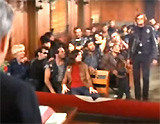
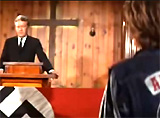

|

|
Bonnie
and Clyde (1967)
Screenwriter(s): David Newman, Robert Benton, Robert Towne (uncredited)
 Enticed
Into an Exciting Life of Crime Enticed
Into an Exciting Life of Crime
Clyde Barrow (Warren Beatty) enticed Bonnie Parker
(Faye Dunaway), a poor waitress, into a glamorous life with his
own unrealistic, ignorant and childish fantasies of freedom,
wealth and fame. He encouraged her to think of him as the answer
to her dreams - they could make history together:
All right. All right. If all you want's a stud
service, you get on back to West Dallas and you stay there the
rest of your life. You're worth more than that, a lot more than
that and you know it and that's why you're comin' along with
me. You could find a lover boy on every damn corner in town.
It don't make a damn to them whether you're waitin' on tables
or pickin' cotton, but it does make a damn to me!...Why?
What's you mean, 'Why?' Because you're different, that's why.
You know, you're like me. You want different things. You've got
somethin' better than bein' a waitress. You and me travelin'
together, we could cut a path clean across this state and Kansas
and Missouri and Oklahoma and everybody'd know about it. You
listen to me, Miss Bonnie Parker. You listen to me. Now how would
you like to go walkin' into the dining room of the Adolphus
Hotel in Dallas wearin' a nice silk dress and have everybody
waitin' on you? Would you like that? That seem like a lot to
ask? That ain't enough for you. You've got a right to that.
He claimed that the "minute" he saw her,
he figured out all that he had just told her, and then complimented
her: "Because
you may be the best damn girl in Texas." He took her to
a restaurant and sized her up. He instinctively appealed
to her wanderlust to leave the boring, dead-end cafe waitress
job she had and join him for adventure and a career in crime:
You were born somewhere around East Texas, right?...Come
from a big ol' family....You went to school, of course, but
you didn't take to it much, because you was a lot smarter
than everybody else, so you just up and quit one day. Now,
when you was 16, 17, there was a guy who worked in a, in a
...right, cement plant, and you, you liked him, because he
thought you were just as nice as you could be. And you almost
married that guy, but then you thought no. You didn't think
you would.
So then you got you your job in a cafe. And
now you wake up every mornin' and you hate it. You just hate
it. You get on down there and you put on your white uniform.
(Bonnie: "Pink,
it's pink.")
And them truckdrivers come in there to eat your greasy burgers
and they kid ya, and you kid 'em back. But they're stupid and
dumb boys with the big ol' tattooes on 'em, and you don't like
it. And they ask ya on dates, and sometimes you go, but you
mostly don't because all they're ever tryin' to do is get in
your pants, whether you want 'em to or not. So you go on home
and you sit in your room and you think, 'Now when and how am
I ever gonna get away from this?' And now you know.
|
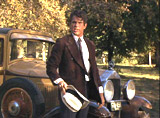
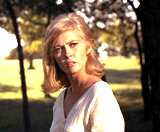
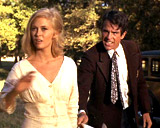
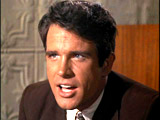
|

|
Bonnie
and Clyde (1967)
Screenwriter(s): David Newman, Robert
Benton, Robert Towne (uncredited)
 Buck's
Earthy Cow Story Buck's
Earthy Cow Story
While on the road to Joplin, older, All-American,
hearty, loud-mouthed, ex-con brother Buck (Gene Hackman) related
a corny joke about a cow to driver Clyde (Warren Beatty):
Hey, you wanna hear a story, about this boy,
he owned a dairy farm, see. And his ol' ma, she was kinda
sick, you know. And the doctor, he called him over and
said, uh, 'Uhh, listen, your Ma, she's just lyin' there.
She's just so sick and she's weakly. And uh, uh I want
ya to try to persuade her to take a little brandy, see.
Just to pick her spirits up, ya know.' And, uh, 'Ma's a
teetotaler,' he says, 'she, she wouldn't touch a drop.'
'Well, I'll tell ya what ya do, uh,' that's the Doc. 'I'll
tell ya what ya do, uh, you bring in a fresh quart of milk
every day. And you put some brandy in it, see. And you
try that.' So he did. And he doctored it all up with the
brandy, fresh milk, and he gave it to his mama. And she
drank a little bit of it. She didn't, you know.
So next day he brought it in again, and she
drank a little more, you know. And so then, it went on that
way. The third day, just a little more, and the fourth day,
she was, you know, took a little bit more. And then finally,
one week later, he gave her the milk and she just drank it
down. Boy, she swallowed the whole, whole, whole thing, you
know. And she called him over and she said, 'Son, whatever
you do, don't sell that cow!'
|
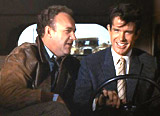
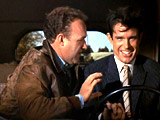
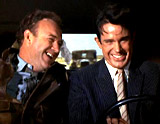
|

|
Cool
Hand Luke (1967)
Screenwriter(s): Donn Pearce, Frank Pierson
 The
Rules of the House The
Rules of the House
Play clip (excerpt): 
New chain-gang prisoners were given the 'rules'
of the house by no-nonsense floorwalker Carr (Clifton James):
Them clothes got laundry numbers on 'em.
You remember your number and always wear the ones that
has your number. Any man forgets his number spends a night
in the box. These here spoons, you keep with ya. Any man
loses his spoon spends a night in the box. There's no playin'
grab-ass or fightin' in the buildin'. You got a grudge
against another man, you fight him Saturday afternoon.
Any man playin' grab-ass or fightin' in the buildin' spends
a night in the box. First bell is at five minutes of eight,
when you will get in your bunk. Last bell is at eight.
Any man not in his bunk at eight spends a night in the
box. There's no smokin' in the prone position in bed. To
smoke, you must have both legs over the side of your bunk.
Any man caught smokin' in the prone position in bed spends
a night in the box.
You get two sheets every Saturday. You put
the clean sheet on the top and the top sheet on the bottom
and the bottom sheet you turn into the laundry boy. Any man
turns in the wrong sheet spends a night in the box. No one'll
sit in the bunks with dirty pants on. Any man with dirty
pants on sittin' on the bunks spends a night in the box.
Any man don't bring back his empty pop bottle spends a night
in the box. Any man loud-talkin' spends a night in the box.
You got questions, you come to me. I'm Carr,
the floor-walker. I'm responsible for order in here. Any
man don't keep order spends a night in the box. (To new
prisoner Luke) I hope you ain't gonna be a hard case.
|
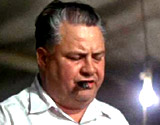
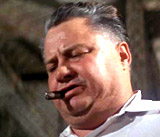
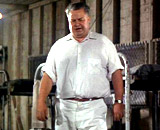
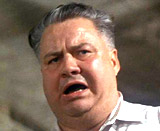
|

|
Cool
Hand Luke (1967)
Screenwriter(s): Donn Pearce, Frank Pierson
 "Failure
to Communicate" "Failure
to Communicate"
Play clip (excerpt): 
The authoritarian Captain (Strother Martin) delivered
his famous "failure to communicate" speech when he
beat recalcitrant and rebellious chain gang member Luke (Paul
Newman) with a billy club:
You're gonna get used to wearin' them chains
after a while, Luke, but you never stop listenin' to them
clinkin'. 'Cause they're gonna remind you of what I've
been sayin' - for your own good.
(Luke: "I wish you'd stop bein' so good to me, Cap'n.")
Don't you ever talk that way to me. (The Captain savagely
struck him down.) Never! Never! What we've got here is
failure to communicate. Some men you just can't reach. So
you get what we had here last week, which is the way he wants
it. Well, he gets it. And I don't like it anymore than you
men.
|
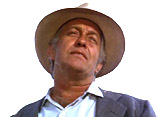
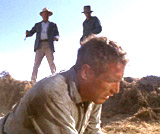
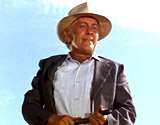
|

|
Cool
Hand Luke (1967)
Screenwriter(s): Donn Pearce, Frank Pierson
 Talking
to God - "I Guess I Gotta Find My Own Way" Talking
to God - "I Guess I Gotta Find My Own Way"
Again a fugitive, Luke (Paul Newman) sat on one
of the plain wooden pews in an abandoned country church. He
delivered a rambling monologue and repeatedly talked to God
and asked for guidance and an answer, occasionally looking
up toward the empty rafters - his entreaties were met with
silence:
Anybody here? Hey, Ol' Man, You home tonight?
Can You spare a minute? It's about time we had a little
talk. I know I'm a pretty evil fella. Killed people in
the war and I got drunk and chewed up municipal property
and the like. I know I got no call to ask for much, but
even so, You've gotta admit, You ain't dealt me no cards
in a long time. It's beginnin' to look like You got things
fixed so I can't never win out. Inside, outside, all of
'em rules and regulations and bosses. You made me like
I am. Now just where am I supposed to fit in?
Ol' Man, I gotta tell Ya. I started out pretty
strong and fast. But it's beginnin' to get to me. When does
it end? What do Ya got in mind for me? What do I do now?
All right. All right.
(He knelt on his knees and cupped his hands
in prayer)
On my knees, askin'. (pause) Yeah, that's
what I thought. I guess I'm pretty tough to deal with, huh?
A hard case. I guess I gotta find my own way.
|
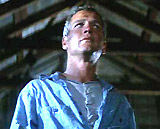
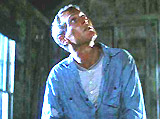
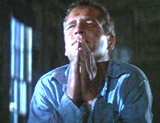
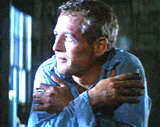
|

|
Guess Who's
Coming to Dinner (1967)
Screenwriter(s): William Rose
 "You
Don't Own Me!" - A Son to Father Talk "You
Don't Own Me!" - A Son to Father Talk
African-American physician Dr. John Prentice
(Sidney Poitier), engaged to marry a white upper-class American
woman named Joanna Drayton (Katharine Houghton) from a liberal
San Francisco family, dared to disagree with his retired postal
carrier father (Roy E. Glenn) from another generation about
the upcoming nuptials and how he was to live his life:
You've said what you had to say. You listen
to me. You say you don't want to tell me how to live my
life? So what do you think you've been doing? You tell
me what rights I've got or haven't got, and what I owe
to you for what you've done for me. Let me tell you something.
I owe you nothing! If you carried that bag a million
miles, you did what you were supposed to do because you
brought me into this world and from that day you owed
me everything you could ever do for me like I will
owe my son if I ever have another. But you don't own me!
You can't tell me when or where I'm out of line, or try
to get me to live my life according to your rules.
You don't even know what I am, Dad. You don't know who I
am. You don't know how I feel, what I think. And if I tried
to explain it the rest of your life, you will never understand.
You are 30 years older than I am. You and your
whole lousy generation believes the way it was for you is
the way it's got to be. And not until your whole generation
has lain down and died will the deadweight of you be off
our backs! You understand? You've got to get off my back!
Dad. Dad. You're my father. I'm your son. I
love you. I always have and I always will. But you think
of yourself as a colored man. I think of myself as a man.
Hmm? Now, I've got a decision to make, hmm? And I've got
to make it alone. And I gotta make it in a hurry. So, would
you go out there and see after my mother?
|
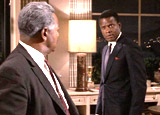
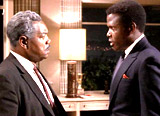

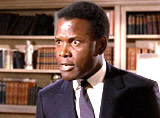
|

|
Guess Who's
Coming to Dinner (1967)
Screenwriter(s): William Rose
 Remembering
Loving a Woman - and Inter-Racial Marriage Remembering
Loving a Woman - and Inter-Racial Marriage
Crusading publisher Matt Drayton (Spencer Tracy
in his final screen appearance) blessed a future marriage by
citing his love for his own wife Christina (Katharine Hepburn)
- he took issue with the statement that he couldn't even remember
what it was like to love a woman the way his future son-in-law
John Prentice (Sidney Poitier), a black doctor, loved his daughter
Joanna (Katharine Houghton):
I have a few things to say and you might
just think they're important. This has been a very strange
day. I don't think that's putting it too strongly. I might
even say it's been an extraordinary day. I've been out
there thinking about the day and the way it has gone and
it seems to me that now, I need to make a few personal
statements. For a variety of reasons.
The day began for me when I walked into this
house and Tillie said to me -- excuse me -- ...this is Miss
Matilda Binks who's been a member of this family for 22 years
and who today has been making a great deal of trouble. Sit
down, Tillie. Now. The minute I walked into this house this
afternoon, Miss Binks said to me, 'Well, all hell's done
broke loose now!' I asked her, naturally enough, to what
she referred, and she said, 'You'll see.' And I did. Then
after some preliminary guessing games, at which I was never
very good, it was explained to me by my daughter that she
intended to get married. And that her intended was a young
man whom I had never met who happened to be a Negro. Well,
I think it's fair to say that I responded to this, uh, news,
in the same manner that any normal father would respond to
it, unless, of course, his daughter happened to be a Negro,
too. In a word, I was flabbergasted. And while I was still
being flabbergasted, I was informed by my daughter - a very
determined young woman much like her mother - that the, uh,
marriage was on no matter what her mother and I might feel
about it. Then the next rather startling development occurred
when you walked in and said that unless we - her mother and
I - approved of the marriage, there would be no marriage....(To
his daughter) This may be the last chance I'll ever have
to tell you to do anything. So I'm telling you, shut up.
Now, it became clear that we had one single
day in which to make up our minds as to how we felt about
this whole situation. So what happened? My wife, typically
enough, decided to simply ignore every practical aspect of
the situation, and was carried in some kind of romantic haze
which made her, in my view, totally inaccessible to anything
in the way of reason.
Now I have not as yet referred to His Reverence, who began
by forcing his way into the situation, and then insulting my
intelligence by mouthing 300 platitudes and ending just a half
hour ago by coming to my room and challenging me to a wrestling
match...Now, Mr. Prentice, clearly a most reasonable man, says
he has no wish to offend me, but wants to know if I'm some
kind of a nut. And Mrs. Prentice says that like her husband,
I'm a burnt-out old shell of a man who cannot even remember
what it's like to love a woman the way her son loves my daughter.
And strange as it seems, that's the first statement made to
me all day with which I am prepared to take issue. Because
I think you're wrong. You're as wrong as you can be.
I admit that I hadn't considered it, hadn't even thought about
it, but I know exactly how he feels about her. And there is
nothing, absolutely nothing, that your son feels for my daughter
that I didn't feel for Christina. Old? Yes. Burnt out? Certainly.
But I can tell you the memories are still there - clear, intact,
indestructible. And they'll be there if I live to be 110. Where
John made his mistake, I think, was attaching so much importance
to what her mother and I might think. Because in the final
analysis, it doesn't matter a damn what we think. The only
thing that matters is what they feel, and how much they
feel for each other. And if it's half of what we felt, that's
everything. (He gave a loving look toward Christina)
(To the young couple) As for you two
and the problems you're going to have, they seem almost unimaginable.
But you'll have no problem with me. (To John) And
I think that uh, when Christina and I and your mother have
some time to work on him, you'll have no problem with your
father, John. But you do know - I'm sure you know - what
you're up against. There'll be a hundred million people right
here in this country who'll be shocked and offended and appalled
at the two of you. And the two of you will just have to ride
that out. Maybe every day for the rest of your lives. You
can try to ignore those people or you can feel sorry for
them and for their prejudices and their bigotry and their
blind hatreds and stupid fears. But where necessary, you'll
just have to cling tight to each other and say screw all
those people! Anybody could make a case, and a hell of a
good case, against your getting married. The arguments are
so obvious that nobody has to make them. But you're two wonderful
people who happened to fall in love and happen to have a
pigmentation problem. And I think that now no matter what
kind of a case some bastard could make against your getting
married, there would be only one thing worse. And that would
be if - knowing what you two are, knowing what you two have,
and knowing what you two feel - you didn't get married. Well,
Tillie, when the hell are we gonna get some dinner?
|
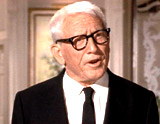
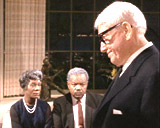
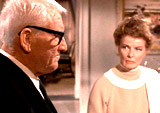
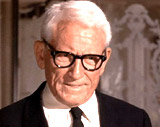
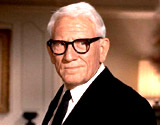
|

|
Up the Down
Staircase (1967)
Screenwriter(s): Tad Mosel
 Go
Beyond What You Know Go
Beyond What You Know
Witty English teacher and unpublished writer,
Paul Barringer (Patrick Bedford), in NY's inner-city Calvin
Coolidge HS, entered the classroom of astonished, idealistic
fellow teacher Miss Sylvia Barrett (Sandy Dennis), and drunkenly
told the students:
They say a writer should stick to what he
knows. What nonsense. What did Dickens know about the French
Revolution? What did Shakespeare know about Moors in Venice?
If he'd stuck to what he knew, we'd have no Othello.
We'd have no Alice in Wonderland. We'd have no Treasure
Island. You brats think that I and Miss Barrett stand
up there day after day, talking about books, and the writing
of books, just for the hell of it? You think it's got nothing
to do with YOU?
A writer creates a book, an individual creates
a life! For a writer to create a masterpiece, he's got to
think beyond what he knows! For an individual to create a
life, even a half-way decent one, he's gotta go beyond what
he knows. Go beyond the poverty, the dope, the disease, the
degeneracy. Go beyond the oceans to the Alps (he pointed
to a map), a magnificent replica of which the Board of
Education has generously donated. Stick with what you think,
and that's what you're gonna be stuck with! You may as well
get out. Now! All of you... Miss Barrett's class dismissed.
All of you dismissed for the rest of your crummy lives. Some
of you prefer to leave by the window. I prefer to leave by
the door. Punch me out. Will ya, Teach?
|

|


























































